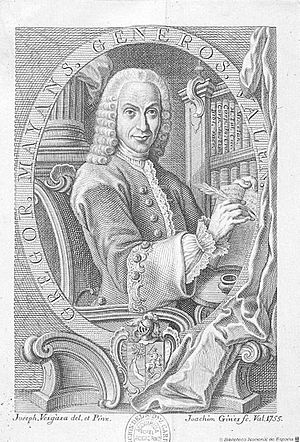Gregorio Mayans facts for kids
Quick facts for kids
Gregorio Mayans
|
|
|---|---|

Portrait by Josep Vergara, 1755
|
|
| Born | 9 May 1699 |
| Died | 1781 Valencia, Spain
|
| Nationality | Spanish |
| Occupation | Historian, linguist, writer |
Gregorio Mayans y Siscar (1699–1781) was an important Spanish historian, linguist, and writer. He lived during a time called the Enlightenment, which was a period when people focused on reason and new ideas. Mayans worked hard to bring back and share the knowledge of older Spanish thinkers.
Contents
Early Life and Learning
Gregorio Mayans was born on May 9, 1699, in Oliva, a town in Valencia, Spain. His father, Pasqual Maians, supported the Austrian side in the War of the Spanish Succession. This made things difficult for Gregorio later, as Spain was then ruled by the House of Bourbon.
Until 1713, Mayans studied with the Jesuits. But his grandfather, Juan Siscar, encouraged him to study law. He went to the University of Valencia, where he learned from famous teachers. These teachers introduced him to the ideas of thinkers like John Locke and René Descartes. These ideas greatly influenced Mayans' own thinking.
In 1719, Mayans moved to Salamanca to continue studying law. There, a professor connected him with Manuel Martí, a dean from Alicante. Martí became his mentor and guided him in studying classic Spanish, Latin, and Greek writers. Martí also introduced Mayans to the Renaissance and Spanish humanists from the 1500s. These included important figures like Juan Luis Vives and Miguel de Cervantes. Mayans spent his life trying to preserve this knowledge, which he felt was being forgotten.
Early Career and Challenges
Mayans became a professor of law at the University of Valencia. However, he faced problems with his fellow professors. In 1725, he published a work praising the writings of Diego Saavedra Fajardo. In 1727, he wrote another piece where he criticized the overly complex style of the Baroque period. He preferred the simpler, clearer style of earlier Spanish writers.
That same year, he visited Madrid. There, he met the head of the Real Academia Española (Spanish Royal Academy) and the director of the Biblioteca Nacional de España (National Library of Spain). He also exchanged letters with other thinkers but later disagreed with them.
Mayans believed that legal studies needed to change. He thought there should be less focus on old Roman law and more on Spanish laws. He also suggested a general plan to improve education to a minister named José Patiño, but his ideas were not put into action. For example, he suggested teaching everyday Latin instead of the more formal Church Latin.
Later Life and Retirement
In 1730, Mayans left the University of Valencia and moved to Madrid. There, he became a royal librarian. This allowed him to connect with scholars across Europe. In 1733, he published his Orador Cristiano (Christian Orator). He worked at the National Library for seven years. In 1737, he sent a detailed plan for Spanish cultural and educational reform to Minister Patiño, but he never received a reply.
In 1740, Mayans decided to retire to his hometown of Oliva. He wanted to focus on his studies and wrote many letters to other scholars in Spain and other countries. After retiring, he married his cousin, Margarita Pascual.
In 1742, he started the Valencian Academy. This group aimed to find and share old and new information about Spain. Mayans' work sometimes caused disagreements with other important academies. For example, when he edited a book by Nicolás Antonio, the Valencian Academy came to the attention of the Spanish Inquisition.
However, things improved for Mayans. After Ferdinand VI of Spain became king, a powerful minister helped him. Later, Charles III of Spain restored his good name and gave him an important administrative job. In 1776, he joined the Royal Economic Society of Friends of the Country of Valencia. He continued to talk with local scholars. Mayans spent his last years preparing a complete edition of the works of Juan Luis Vives, but he passed away unexpectedly in 1781.
Other Important Works
Besides the works mentioned, Mayans edited other important books. He greatly admired writers like Ambrosio de Morales. He also helped with a literary newspaper using a pen name.
One of his most important books was Orígenes de la lengua española (Origins of the Spanish language), published in 1737. This book brought to light an important old text about the Spanish language. He also reprinted the Reglas de Ortographía (Rules of Orthography) by Antonio de Nebrija twice.
In 1757, he wrote a book on rhetoric, which is the art of speaking or writing effectively. This book was a great collection of Spanish literature and the best analysis of Spanish prose for many years. Mayans also wrote the first biography of Miguel de Cervantes, the famous author of Don Quixote, which was published in 1738.
See also
 In Spanish: Gregorio Mayans para niños
In Spanish: Gregorio Mayans para niños
 | John T. Biggers |
 | Thomas Blackshear |
 | Mark Bradford |
 | Beverly Buchanan |

